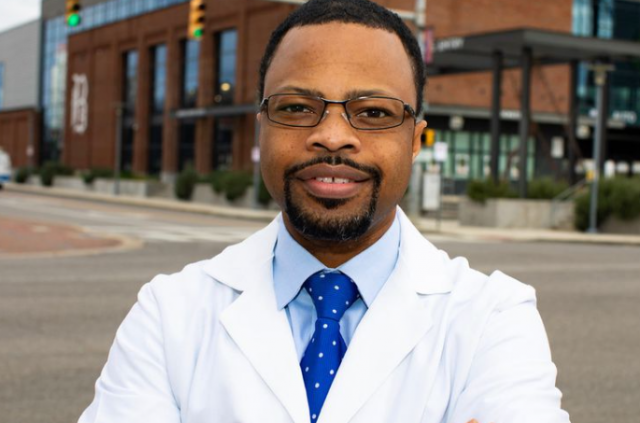
By Barnett Wright and Ryan Michaels
The Birmingham Times
David Hicks, DO, deputy director of the Jefferson County Department of Health, has been elected to succeed Mark Wilson, M.D. as Health Officer, which is the top position in the department.
If approved by the state, Hicks will become the first African-American to hold the position and take office Oct. 1.
The vote of the Board of Health on Wednesday evening is still subject to approval by the State Committee of Public Health, which has been a formality in the past. That committee represents the state board of health.
JCDH is tasked with promoting public health across the county through public communication, investing in community health programs, seeking to increase access to health services and promoting a reduction in chronic and infectious disease. It is also responsible for inspecting the various health care facilities to ensure they meet legal requirements.
Hicks has been deputy director at JCDH since 2016 and with the department since 2014. He underwent medical training at the University of Medicine & Dentistry of New Jersey School of Osteopathic Medicine, now the Rowan-Virtua School of Osteopathic Medicine.
Before medical school, Hicks earned his bachelor’s degree in biology and his Master of Public Health degree from the University of Pittsburgh in Pennsylvania.
Hicks grew up in Willingboro, New Jersey and wanted to be a neurosurgeon since the age of nine, when in 1987, now-retired Ben Carson performed the first known separation of conjoined twins joined at the backs of their heads.
From an early age, Hicks said his biology fascination stood him apart from his peers.
“I was the weird kid watching medical shows and science stuff. Everybody else was watching cartoons,” Hicks told AL.com in 2021.
In Willingboro, Hicks was raised with seven other people in the house and was the first among his family to attend college.
Hicks met his wife LaToya, who is also a doctor, during medical school. The pair completed their medical residencies together at ChristianaCare Health Systems Hospital in Wilmington, Delaware.
Hicks and LaToya moved to Birmingham in 2012 to take jobs at Birmingham Health Care, now Alabama Regional Medical Services (ARMS).
From 2012 to 2014, Hicks served as chief medical officer at Birmingham Health Care and as a site physician at Advanced Correctional Healthcare. From 2014 to 2020, Hicks worked as a physician for American Family Care on an as-needed basis.
In 2020, with the onset of the COVID-19 pandemic, area leaders set up the Jefferson County Unified Command Center to tackle the disease. Hicks, at that point the deputy health officer for JCDH, served as the branch director of public health for the command.
Hicks was one of the strongest voices advocating that Jefferson County residents get vaccinated against the novel coronavirus, particularly for Black residents.
As a public health advocate, Hicks focuses on a number of social determinants of health, including employment opportunities as well as transportation and other infrastructure.
“If where you live doesn’t have employment opportunities, and you have to get to those jobs without access to public transportation like in cities like New York and others, it can impact your bottom line—the school system you may enroll your kids in, the pollution in your neighborhood, your wallet. It’s all interconnected,” Hicks told AL.com.
Wilson, 61, who became health officer in 2011, announced in February that he would be stepping down. In an email to staff on Thursday he said was looking forward to seeing good things at JCDH and “a healthier Jefferson County for all under Dr. Hicks’s leadership.”
Hicks has said making health care access more equitable was a chief concern.
“There are still inherent inequities in the overall system, in society. Health equity principles must guide all of our decisions,” Hicks told AL.com.




